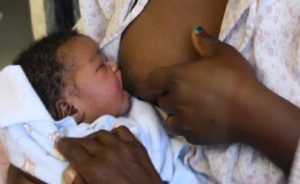


Don’t give babies water within six months of birth — UNICEF cautions mothers
By Ismail Azeez, Osogbo
The United Nations Children’s Fund (UNICEF) has cautioned lactating mothers against feeding their babies with water or any liquid substance other than breast milk within the first six months of life.
This message was emphasised during the 2024 World Breastfeeding Week Flag-off and World Breastfeeding Record Initiative, where a record-breaking 30,000 lactating women from across Nigeria’s 36 states, the Federal Capital Territory, and selected Internally Displaced Persons (IDP) camps simultaneously breastfed their babies.
This is as Nigeria has now surpassed the previous world record of 21,000 lactating women set by the Philippines in 2013.
Izuchukwu Michael Offiaeli, the UNICEF Public Health Nutrition Officer and the Breastfeeding Record Facilitator, commended Breastfeeding mothers that participated in the historic event.
Offiaeli said “while the target was to engage 30,000 lactating women, an impressive 31,254 women, along with their babies, turned out across the states and IDP camps to set a new world record for the highest number of lactating women breastfeeding simultaneously.”
Offiaeli said breast milk has over 88 percent water, providing all the water a baby needs and cautioned that giving water to babies during the first six months of life is the major barrier to improving exclusive breastfeeding (EBF) rates in the country.
Offiaeli encouraged mothers to choose breastmilk only for their babies in the first 6 months of life to ensure optimal health for their infants.
In her Goodwill Message at the event, UNICEF Country Representative, Cristian Munduate commended the Nigerian government for creating an enabling environment for lactating mothers in the country to breastfeed their babies.
Munduate called on all stakeholders in Nigeria to come together to close the gap in breastfeeding inequalities by supporting breastfeeding mothers across the country to practise exclusive breastfeeding. She harped on the need to empower mothers with the knowledge and support they need to make the best choices for their children’s health.
She said despite breastfeeding being the foundation of lifelong health and well-being among other proven benefits, rates of early, exclusive and continued breastfeeding in Nigeria remain low as a result of cultural, social and practical barriers.
She called on all stakeholders including government, members of civil society organisations, government, policymakers, health systems, workplaces, communities, fathers and grandparents to come together to close the gap in breastfeeding inequalities in Nigeria.
According to her, “We are gathered, not just to break a world record; but we are here to make history and send a powerful message to the world about the importance of breastfeeding.”
“Let us ensure that breastfeeding support is integrated into Nigeria’s emergency response plans to protect the youngest and most vulnerable members of our society. Unregulated donation of breast milk substitutes and lack of clean water can put infants at higher risk of malnutrition and mortality.
“Let us ensure that all health workers, especially skilled birth attendants, support mothers to initiate breastfeeding early and be supported to succeed with exclusive and continued breastfeeding,” she said.
Munduate reiterated UNICEF’s steadfast commitment to supporting Nigeria in its journey towards better child health and nutrition.
The Coordinating Minister of Health and Social Welfare, Prof. Muhammad Ali Pate said the global theme of the event “Closing the Gap, Breastfeeding Support for All” underscores the collective responsibility to ensure that lactating mothers receive the support they need to make breastfeeding a successful and fulfilling experience.
Quoting the Global Breastfeeding Scorecard, Pate said “global exclusive breastfeeding rates have increased to 48 percent; while in Nigeria, according to the 2021 Multiple Indicator Cluster Survey (MICS), only 34 percent of children 0 to 6 months are exclusively breastfed. This is a far cry from the global average and the World Health Assembly target of 50 percent by 2025.”
“It is interesting to note that the same survey reveals that 96.7 percent of children are breastfed at one point or the other, while 69.6 percent receive breast milk as the predominant source of nourishment (i.e. they receive breast milk and certain fluids like water and water-based drinks). This indicates that Nigerian mothers want to breastfeed but they need support to practise optimal breastfeeding as recommended,” he said.
The Permanent Secretary, Federal Ministry of Health and Social Welfare, Daju Kachollom said despite breastfeeding being a natural process, women need adequate support both to get started and to sustain optimal breastfeeding.
“We must adequately support our women to breastfeed, so that we will be able to reap the manifold benefits of breastfeeding. Breastfeeding is one of the smartest investments we can make as a nation to build our future prosperity. It brings huge returns to the child, mother, family and the nation.
“It offers children unparalleled health and brain-building benefits, and has the power to save the lives of women and children throughout the nation, and to help our national economy grow through lower health care costs and smarter work forces,” he said.



